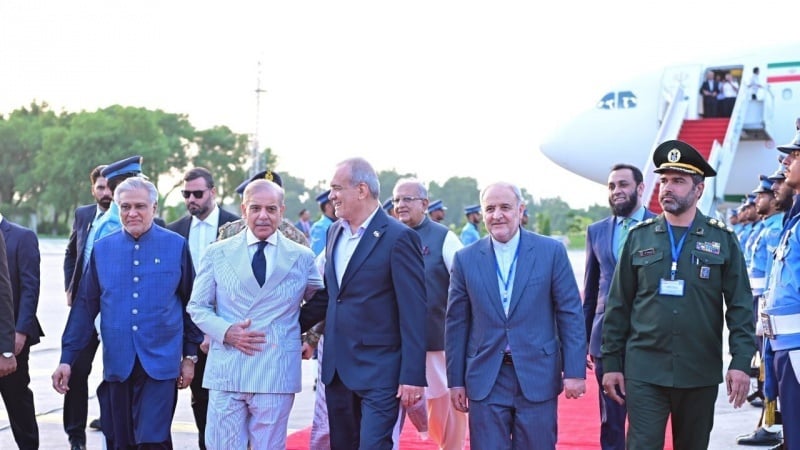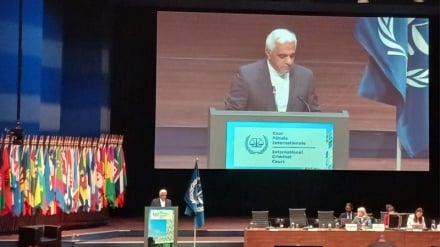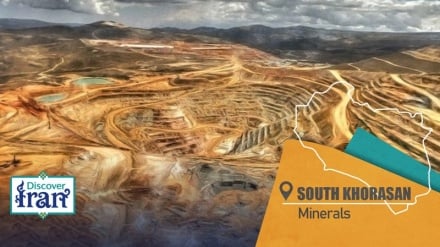Why Pezeshkian’s visit to Pakistan holds special significance in regional geopolitics
-

Shehbaz Sharif welcomes Pezeshkian
Pars Today – Iranian President, Masoud Pezeshkian’s visit to Pakistan is not only a symbol of Tehran’s active diplomacy but also a sign of Iran’s growing role in the region’s geopolitical dynamics.
Masoud Pezeshkian, President of the Islamic Republic of Iran, has arrived in Islamabad at the head of a high-ranking political and economic delegation. He was officially received by Pakistan’s Prime Minister Shehbaz Sharif and Iran’s Ambassador to Islamabad, Reza Amiri-Moghaddam. Pezeshkian’s official visit marks a turning point in the longstanding relationship between Tehran and Islamabad.
During this trip, the two countries’ leaders will hold talks aimed at redefining economic and trade relations, enhancing regional cooperation, and boosting synergy in political and security fields. On Saturday, August 2, President Pezeshkian arrived in Lahore, where he visited the mausoleum of Allama Muhammad Iqbal before heading to Islamabad. His visit to the mausoleum—long a symbol of cultural cooperation between Iran and Pakistan—highlighted cultural diplomacy as a foundation for deepening political and economic ties.
Exchanging views on ongoing regional developments—including the situation in Gaza, West Asia, and the consequences of Israeli aggression—will also be part of Pezeshkian’s discussions with Pakistani officials. In addition, preparations for convening the Iran-Pakistan Joint Economic Commission meeting in Tehran are on the agenda.
This marks the fifth official meeting between the two countries’ leaders within the past year and follows just two months after the joint visit to Tehran by Pakistan’s Prime Minister and Army Chief. The continued phone conversations between Pezeshkian and Shehbaz Sharif in recent months indicate a strong mutual will to deepen bilateral cooperation. This visit holds special importance not only in the diplomatic calendar of both nations but also within the region’s broader geopolitical equations.
The Iranian president’s official trip to Pakistan—warmly welcomed by top Pakistani officials—is considered a milestone in strengthening Tehran-Islamabad ties, especially in the economic, security, and regional spheres. This visit aligns with the 14th government's policy of enhancing neighborhood diplomacy and expanding regional bonds, and it is expected to yield tangible outcomes in bilateral relations.
Pezeshkian’s trip also serves as a symbol of unity among Muslim countries in the face of common threats and the pursuit of regional frameworks for cooperation. Strengthening Iran-Pakistan ties not only contributes to the stability of both nations but also promotes peace and security across the entire region. In a time when U.S. interventionist policies have fueled regional instability, the collaboration between two populous, Muslim countries sharing long borders could serve as a model for constructive engagement in the Islamic world.
President Pezeshkian and senior Pakistani officials aim to redefine trade and economic relations, reinforce regional cooperation, and boost political and security coordination. As Iran and Pakistan approach the 78th anniversary of diplomatic relations, this visit marks a new chapter in the deepening of their partnership. A key goal is to raise bilateral trade volume to $10 billion—a clear indicator of both sides’ strong resolve to expand economic cooperation.
In the current geopolitical context, Iran-Pakistan regional cooperation goes beyond a mere bilateral relationship; it serves as a strategic pillar for stability, development, and confronting shared threats in the region. Pakistan seeks a long-term partnership with Iran to secure regional peace and emphasizes the defense and security cooperation between the two countries. Both nations are pursuing joint security strategies to confront common threats such as terrorism, smuggling, and border insecurity.
Tehran and Islamabad have also adopted aligned and supportive stances on the developments in Gaza and the Israeli regime’s aggression, reflecting shared political and ideological views. Regional cooperation between Iran and Pakistan not only benefits the two nations but the entire region. Such collaboration could become a model for Islamic convergence, resistance to extra-regional threats, sustainable development, and regional unity.
MG


